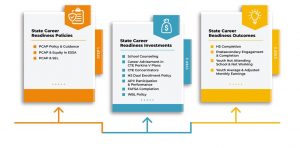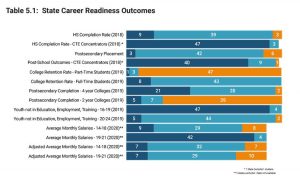 In May, the Coalition for Career Development Center released the first annual The Condition of Career Readiness in the United States. The 129-page report evaluates key states’ career readiness policies, investments and outcomes across all 50 states, including personalized career and academic plans (PCAP), funding, curriculums, accountability, and Career Technical Education (CTE) program outcomes. Accompanying the report is an interactive national map that links available PCAP resources, work-based learning (WBL) toolkits, Perkins V plans, social-emotional learning (SEL) toolkits and ESSA plans for each state to allow state leaders to assess and enhance their career readiness systems
In May, the Coalition for Career Development Center released the first annual The Condition of Career Readiness in the United States. The 129-page report evaluates key states’ career readiness policies, investments and outcomes across all 50 states, including personalized career and academic plans (PCAP), funding, curriculums, accountability, and Career Technical Education (CTE) program outcomes. Accompanying the report is an interactive national map that links available PCAP resources, work-based learning (WBL) toolkits, Perkins V plans, social-emotional learning (SEL) toolkits and ESSA plans for each state to allow state leaders to assess and enhance their career readiness systems
The report finds that “[to] become a Career Ready Nation we all have work to do. And, cost-effective solutions and strategies used by many states or regions within states offer a way forward.” As a 50-state landscape of key components of career readiness, this report gives state Career Technical Education (CTE) leaders valuable findings and guidance to better align and interconnect career readiness systems that are responsive to the needs of each learner across their entire career journey.
Here are several recommendations and state highlights that state CTE leaders can consider to make that alignment possible;
Recommendation 1: Expand Post-School Outcome Data
 For postsecondary CTE concentrators, the report finds that 40 states are placing 70 percent or more of secondary learners into postsecondary training and education, military or employment after high school graduation. Only three states, however, are placing 70 percent or more of all high school graduates into either a two-year or four-year postsecondary training or education program. The report recommends expanding post-school data points as well as counting military service and employment as post-school outcomes for learners.
For postsecondary CTE concentrators, the report finds that 40 states are placing 70 percent or more of secondary learners into postsecondary training and education, military or employment after high school graduation. Only three states, however, are placing 70 percent or more of all high school graduates into either a two-year or four-year postsecondary training or education program. The report recommends expanding post-school data points as well as counting military service and employment as post-school outcomes for learners.- Kansas, in addition to assessing advanced social-emotional learning (SEL) skills that serve as high-demand employability skills, creates an annual report that provides high schools with information on the average percentage of students that complete career interest surveys; write postsecondary goals and post-secondary plan; and complete portfolio tracking for internship records, dual course credit; certifications and applications to postsecondary education.
Recommendation 2: Identify Engagement Strategies for Learners Ages 16 to 19
- 47 states were found to be connecting more than 90 percent of their youth population aged 16 to 19 to education, training programs, or employment. However, only five states reported that more than 90% of their young adults aged 20 to 24 are connected to education, training programs, or employment. The report recommended that longitudinal data systems be designed to determine whether and when young adults become disconnected.
- The 16+ DataHub, managed by Scotland’s Careers Services, integrates data from a range of sources including education, workforce, and health and human services. Once identified, Careers Services deploys a career counselor to reconnect them to education, training, and employment opportunities.
Recommendation 3: Invest in PCAP
- While 30 states offer high-quality career readiness policies, referred to as personalized career and academic plans (PCAP), the report highlights the need to improve alignment through cross-sector teams. Specifically, the report recommends leveraging federal and state funds to support the adoption and quality implementation of PCAPs or other career planning processes by schools, youth-serving organizations and higher education institutions. Additionally, cross-sector teams should focus on aligning PCAP with the state’s education, workforce development, wellness, and career readiness policies, resources and initiatives.
- The Delaware Pathways initiative is a cross-sector-created team of diverse stakeholders who established a common vision and language for linking their PCAP (referred to as Student Success Planning) with CTE, SEL, and work-based learning initiatives in a manner that seeks to increase access for all learners. Advance CTE featured Delaware Pathways in a recent brief on braiding funding in career pathways design.
Recommendation 4: Increase Access to Work-based Learning Opportunities
- Wage and employment opportunities increase when youth have career conversations and experiences. The report finds that 29 states identified work-based learning as an important element in their Perkins V plans. However, fewer than ten states name specific plans to enact or expand key work-based policy areas. The report recommends providing statewide infrastructure to support implementation; using state and federal funding incentives to encourage industry/business participation and communication systems that enable stakeholders to access and participate in work-based learning and leveraging intermediaries to provide capacity for state-wide work-based learning implementation infrastructure is an effective solution.
- Iowa established a network of 15 regional intermediaries through its community college system which connects industry partners and the education system to offer relevant, work-based learning activities to learners. This work was highlighted in an Advance CTE webinar earlier this year.
Recommendation 5: Invest in Career Advising
- High schools in just 28 states are meeting the American School Counseling Association’s recommended school counselor to student ratio of 250:1. To further this progress, the report calls for more investment in career readiness for elementary and middle school learners and emphasizes exposure can make a difference in aiding learners to select the best career pathway.
- PBS Kids has created programs for learners ages three to six to give them the opportunity to see themselves reflected in various careers regardless of race, disability, or gender. Cajon Valley Union School District’s World of Work Initiative focuses on supporting children from lower income and racially diverse communities to build confidence through mentorship and career exposure.
The extensive report includes sources cited from several publications in Advance CTE’s Learning that Works Resource Center (specific references can be found starting on page 119.)
Brice Thomas, Policy Associate
Tags: Career Advisement, career readiness, Delaware, ICAP, Intermediaries, Iowa, kansas, Learner Engagement, student outcomes, work-based learning

